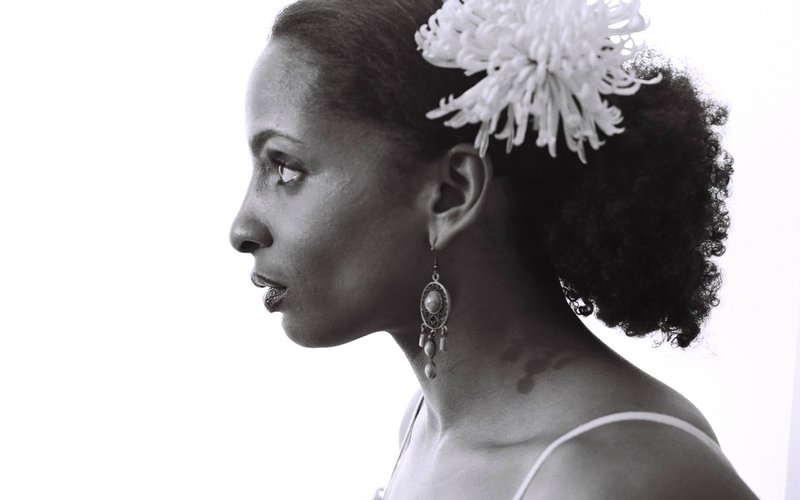
In celebration of Black History Month, KEXP’s Alina Santillan interviewed numerous local and national African American artists about what Black History Month and Black Future mean to them. Om Johari is a Seattle based Afro-Punk Musician and Feminist Activist who has sung in Bad Brains and AC/DC cover bands. She has a unique and interesting perspective on Black History Month and why artist Nina Simone matters.
KEXP: What do either Black History or Black Future mean to you?
Probably for me, I'm more focused on Black Her-story Month. I've been using the "FakeBook" to post about the different women in black history who often get overlooked because we are overshadowed by the same tropes. So to me, black herstory is celebrating the accomplishments and movements of women who are the backbone and the quintessential important keys to every single resistance that's gone on in the black community and influenced the major changes in the United States, whether it's a civil rights movement or the pseudo women's movement.
If you're not cognizant and/or aware of black excellence that has already always existed since we've been on this continent, then it is difficult, I think, to feel empowered about what the possibilities of a future are. You can't just all of a sudden wake-up and decide like -- well, I mean, I suppose you could -- but not in the matrix of oppression that we live in as black and brown folks, you just can't do that. But I think that it's very interesting, especially with movies like Black Panther coming out. And there's going to be a celebration with The Bushwick Book Club over at Town Hall which KEXP's DJ Riz is involved in, discussing Octavia Butler, who is the quintessential Queen of Afrofuturism. [ed. note: this event has since passed.] What does our future look like?
I think the youth always need to be empowered by being reminded of the great black excellence and the accomplishments that we've already achieved, and a lot of that doesn't always have to come from talking about slavery and/or the civil rights. It can be just as simple as discussing black architects. And the sad thing about our school systems -- especially in Seattle and the decimation of black and brown spaces and gentrification -- is you have this overwhelming number of white teachers now who are not well-versed and/or interested in passing along that knowledge in those elementary schools and junior highs that used to be in the Central District all the way to the south. When I was growing up as a kid, we always discussed black excellence, so black excellence, in my opinion, gives you the fuel to believe in what you can do in the future.
Has there been a musician who has been really influential to you?
Musician? I mean, I know you're probably asking that because I'm a musician. But I think that's a difficult question. There's a bunch. I mean, you know some obvious, of course. Well, not "of course", but for me, an obvious would be Nina Simone because she was a person of black excellence. You know, doing black classical music and speaking up as an activist and involved in the struggle with black people and civil rights and a folk singer, and also very unapologetically black. There were periods in her life where she didn't actually allow for white audiences to come and see her play. So, she's somebody that speaks loud to me about the lengths at which a person will go to let folks know that they're sick and tired of being sick and tired, even though they're the golden child. That would definitely be one, but there are many matriarchs.
Why do you think music matters?
With a name like "Om," as the Hindus, it's sort of the sound in the pulse of the universe. Music matters because that is the natural prayer of all things that exist. You can't stand amongst the lush Amazons or rainforest or parts of Burundi without listening to the earth and the sound it makes. And then from that, we've used our rhythm and our voices and added to it. Whenever there's a movie about an Armageddon, it starts with silence. (laughs) And then a choir of little kids singing.
For more and a litany of amazing interviews featuring the incredible African-American musical artists that have shaped our lives, click here for all our Black History Month coverage.
Bridging the illustrious musical legacy of Seattle’s Central District and his family’s rich Senegalese heritage, "wordsmith MC" Yirim Seck brings a unique insight to Black History Month and Black Future.
Whitney Mongé is a Seattle musician, who plays what she calls “Alternative Soul”, a blend of the R&B and ‘90s rock music that inspired her. In celebration of Black History Month, she shares influences and talks about how it's "pretty cool to be a brown person playing music."
Seattle rapper Gifted Gab talks about celebrating black history all your round, getting her musical education from her mom, and offers inspiring words to other minority artists trying to make their own way.
SassyBlack talks about Quincy Jones, debunking the myth that there's a lack of women producers, and how vast blackness really is.
Guitarist Jimmy James of the True Loves and Delvon Lamarr Trio talks about his musical influences, and how music breaks through the language barrier and brings people together.